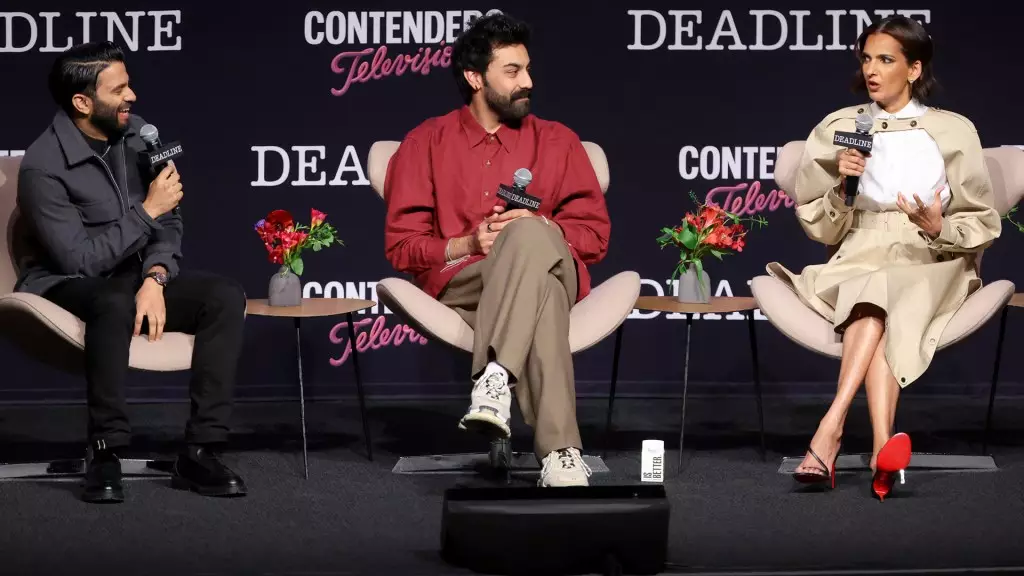In an industry often criticized for its lack of diverse representation, Poorna Jagannathan’s striking performance as Lucky Auntie in Hulu’s comedy series *Deli Boys* serves as a bold beacon of change. This character, originally designed for a male actor, reflects not only a shift in creative storytelling but also a significant cultural commentary on how women, especially women of South Asian descent, are portrayed in mainstream media. By evolving a role steeped in traditionally masculine traits, the series challenges viewers to reconceptualize what a crime boss looks and behaves like, enabling a refreshing shake-up of gender norms in the genre.
Jagannathan’s role goes beyond mere tokenism; it brings a complexity and depth that is often reserved for male characters. As she describes the character, Lucky Auntie is “a mix of Tony Soprano and The Real Housewives of Orange County,” a striking juxtaposition that highlights the duality of her character—a fierce homegrown criminal who navigates her rough edges with the soft-heartedness typical of a nurturing figure. This blend of brutality combined with tenderness is an exhilarating portrayal that is seldom showcased in popular media.
The Editing Room Floor and Geena Davis’ Influence
The evolution of Lucky Auntie’s character owes much to the pivotal moment when creator Abdullah Saeed attended a talk by actress and advocate Geena Davis. Her powerful assertion that scripts should be examined for gender inclusivity sparked a rethinking of this narrative. This act of advocacy towards gender parity in storytelling is not merely inspiring; it aligns with a larger need for female characters who break away from overused tropes.
Saeed’s decision to reimagine Luck Auntie as a woman instead of a man exemplifies an important shift in how characters are being constructed today. This story of transformation illustrates how critical it is to confront societal norms and reshape them, particularly in a medium as influential as television. In fact, the very dialogue surrounding this creative choice points to a deeper cultural shift that is taking place within Hollywood—a trend towards embracing diversity over tradition.
A Fusion of Toughness and Tenderness
What makes Jagannathan’s performance truly extraordinary is her ability to embody this multifaceted femininity. To play a character capable of simultaneously wielding a gun while also embodying the nurturing qualities of an “auntie” is a nuanced approach that reveals a strength typically reserved for male characters. In today’s entertainment landscape, where public discussions about the representation of women and marginalized groups are increasingly prevalent, Lucky Auntie stands out as a necessary disruption.
Her co-star, Asif Ali, points out this unique blend of hardness and softness, noting how lucky auntie integrates femininity into a role often steeped in male bravado. This softer side humanizes her character in a way that connects with viewers on emotional levels. When she wipes blood from her nephews’ mouths or fusses over their well-being, the audience sees not just a crime boss but a loving caretaker who navigates chaos with sleek effectiveness. This portrayal flips the script on how we envision family dynamics in caper narratives, weaving in cultural specificities that resonate deeply with viewers who share similar backgrounds.
Charting New Territory in Entertainment
The groundbreaking nature of *Deli Boys* represents a significant step forward for storytelling, particularly within the crime drama genre, where the trappings of male-centric narratives have long dominated. The glitz and glamour of crime boss tropes are imbued with an often-overlooked feminine touch, reshaping the ordinary into the extraordinary. But Lucky Auntie’s rising popularity also poses an interesting question for future creators: how many more characters could be redefined through a similar lens of inclusivity?
Conversely, the series emphasizes how cultural backgrounds can inform character motivations differently. From the maternal instincts to the tough exterior, Jagannathan encapsulates elements of her identity as a South Asian mother while navigating the role of a crime overlord. The resulting character is not only engaging but also provides an insightful commentary on the roles that women fulfill within both familial and criminal frameworks.
Ultimately, Lucky Auntie’s fierce yet nurturing presence is more than just entertaining; it sets a new standard for what audiences should expect from character development and representation on screen. The ways in which narratives can be transformed by merely flipping the gendered expectations open a broader dialogue on inclusivity and creativity, forever altering perceptions of crime and power dynamics in modern storytelling.

